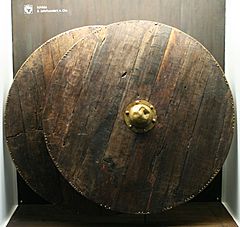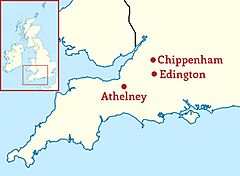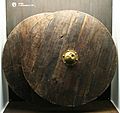Battle of Chippenham facts for kids
Quick facts for kids Battle of Chippenham |
|||||||
|---|---|---|---|---|---|---|---|
| Part of Viking invasions of England | |||||||
|
|||||||
| Belligerents | |||||||
| Great Heathen Army | Wessex | ||||||
| Commanders and leaders | |||||||
| Guthrum | Alfred the Great | ||||||
| Strength | |||||||
| 5,000 | Unknown. At least 300 of Alfred's Hearthweru guard deployed. | ||||||
| Casualties and losses | |||||||
| Unknown | Heavy | ||||||
The Battle of Chippenham happened in January 878. It was a fight between the Viking army, led by Guthrum, and the Anglo-Saxon army, led by Alfred the Great. The Vikings won, forcing Alfred to run away from Chippenham. They took control of most of Wessex for a short time.
This battle was part of a big Viking attack on Wessex. Viking leaders Guthrum and Ubba worked together. They broke a peace agreement they had made earlier. King Alfred was staying in Chippenham for the winter. His army was not with him. He had to escape to Athelney.
Later, another Viking leader, Ubba, was defeated. King Alfred then gathered his soldiers. He took back Wessex after the Battle of Edington in May 878. Guthrum never attacked Wessex again. He agreed to the Treaty of Wedmore. Alfred then changed his army. He wanted to make sure there was always a force ready to fight.
Contents
Why the Battle Happened
The Vikings first started raiding Britain around the late 700s. They attacked places like Lindisfarne monastery. These raids continued for many years. In the 860s, Viking armies came to Britain to conquer land.
The Great Heathen Army of Vikings arrived in 865. Within ten years, they had conquered three Anglo-Saxon kingdoms. These were East Anglia, Mercia, and Northumberland.
Just before Alfred the Great became king in 871, the Vikings attacked Wessex. Alfred defeated them at the Battle of Ashdown. Even with this win, Alfred had to pay the Vikings. This was to stop them from invading again.
In 874, the Viking army split up. One group, led by Guthrum, went south towards Wessex. A supply fleet sailed to support them. In 875 or 877, a storm destroyed this fleet. Alfred then surrounded the Vikings at Exeter. He forced them to leave Wessex. They exchanged hostages as a sign of peace.
This peace agreement was broken in 878. The Vikings launched a planned attack. Guthrum attacked from East Anglia. Ubba attacked from the Severn area.
The Battle at Chippenham
King Alfred was spending the winter at his royal home near Chippenham. Guthrum surprised him with an attack just after New Year. Alfred's army, called the fyrd, was not gathered. The fyrd was an army made of lords and common people. It took time to bring them together.
Because his army was not ready, Alfred had to run away. The Vikings quickly took Chippenham. Guthrum's attack happened when the Saxon soldiers were celebrating a holiday. Many of Alfred's warriors were killed. The rest were scattered. Some survivors even fled across the English Channel to France.
Anglo-Saxon Soldiers
The Anglo-Saxon army, the fyrd, was called up when needed. They were meant for quick battles. After a fight, these soldiers would go home. Most soldiers carried spears. Richer men might also have swords. For protection, they wore cone-shaped helmets. They also carried round shields. Wealthier soldiers might have worn chain mail armor.
Viking Soldiers
Viking weapons depended on their social class. Most Vikings carried a spear, a shield, and an axe or small knife. Richer Vikings might also have javelins and helmets. Armor was mostly for noblemen and professional fighters.
Viking tactics involved taking strong places like royal estates. They would make these places even stronger. From these bases, they would raid the land around them. They tried to avoid big fights with stronger armies. These tactics worked well against the Anglo-Saxons. The Anglo-Saxons were not used to long sieges. Their army system was for short campaigns.
What Happened Next
After his defeat at Chippenham, Alfred had to hide. He went to the Island of Athelney. The Vikings almost ruled all of Wessex. From Athelney, Alfred slowly gathered his forces. In May, he defeated Guthrum at the Battle of Edington.
Earlier that year, Ubba was defeated by Odda, Ealdorman of Devon. This helped Alfred take back Wessex. After the Treaty of Wedmore, Guthrum was baptized. He then left Wessex for good.
Alfred learned a lot from his defeat. He changed the military system of Wessex. He made sure there were always some troops ready to defend the kingdom. Thirteen years later, the Vikings attacked Wessex again. This time, they found a strong, mobile army ready to fight them. This new army rotated soldiers. This meant some were always home to protect their own lands.
Images for kids





